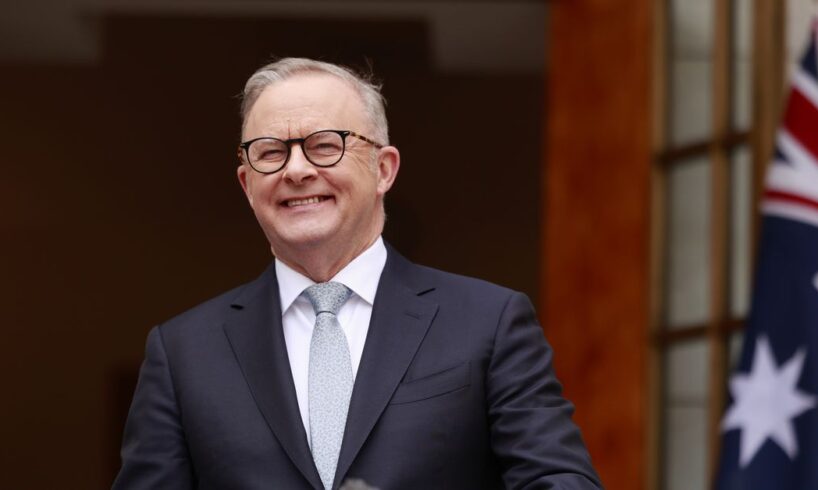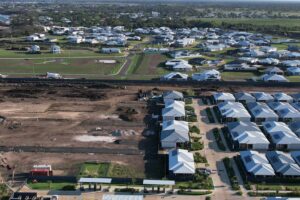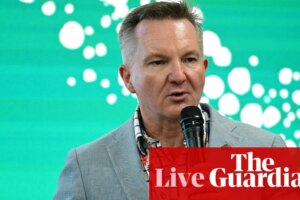
The International Monetary Fund (IMF) has advised the Australian government to raise the goods and services tax (GST) and tighten spending in its annual check-up of the economy.
The Washington-based IMF issues an Article IV report for each member country, which assesses economic policies and outlook and provides recommendations.
In Australia’s report published today, the IMF said the Australian economy was “gaining momentum” and forecast to grow to 2.1 per cent next year after recently returning to balance.
The International Monetary Fund (IMF) has advised the Australian government to raise the goods and services tax (GST) and reintroduce a mining tax. (Getty)
“The Commonwealth’s fiscal strategy has been effective over the post-pandemic period, but if structural spending pressures intensify in the future, clearer fiscal anchors could help to safeguard fiscal sustainability,” it said.
The IMF called for tax reform to boost the economy, including a higher GST and the reintroduction of a mining tax.
“A comprehensive tax reform package could usefully complement these efforts by helping boost economic efficiency, productivity and intergenerational equity,” it said.
“For example, an increase in indirect taxation [GST], the reintroduction of a resource revenue tax, and removing income tax exemptions could offset lower corporate and labour taxes, thereby lowering the cost of capital and increasing incentives for investment and work.”
Australia’s largest accounting body, CPA Australia, echoed the call for bold tax reform and said the economy could stagnate without it.
“Australia relies unsustainably on personal and business income tax, weakening our productivity and compressing household budgets,” CPA Australia’s tax lead Jenny Wong said.
“The IMF sends a powerful signal – comprehensive tax reform is vital to preserve Australia’s economic momentum.”
The IMF noted concern over rising state and territory debt and advised the federal government to scrutinise its budgets. (AAP)
The IMF also noted concern over rising state and territory spending and debt and advised the federal government to scrutinise its budgets.
It suggested that the Parliamentary Budget Office of the Treasury be given oversight.
“Rising state and territory debt, driven by increased infrastructure, health and social protection spending and exacerbated by uneven commodity revenues, has caused missed sub-national fiscal targets and widening disparities,” the IMF said.
“Fiscal co-ordination across the federation is crucial to ensure equitable burden-sharing and efficient spending, especially in areas like climate governance and tax reform.”
The IMF endorsed many of the federal government’s policies, which it said have helped Australia manage a “soft landing” amid global uncertainty.
Inflation is now at 3.2 per cent, just a little over the target and almost a third of its peak.
The Reserve Bank of Australia (RBA) has cut Interest rates three times this year and has kept it steady at 3.6 per cent at its latest meeting earlier this month.
The IMF added that Australia has been able to withstand the major impacts of US President Donald Trump’s sweeping tariffs.
Treasurer Jim Chalmers said the IMF’s assessment was a “powerful endorsement of Labor’s responsible economic and fiscal management”. (Alex Ellinghausen)
But persisting global uncertainty still poses a significant threat to the Australian economy.
“Global trade policy shifts and elevated uncertainty may weigh on demand and employment,” the IMF said.
“Domestically, consumption growth may ease, delaying the recovery in private demand, and generating a rise in unemployment.
“On the other hand, inflationary pressures may prove more persistent than expected, including if a resilient job market drives stronger labour costs growth.”
The IMF has, therefore, advised the RBA to maintain a “cautious” monetary policy and hold off on further interest rate cuts if data shows economic tightness remains.
Treasurer Jim Chalmers said the IMF’s assessment was a “powerful endorsement of Labor’s responsible economic and fiscal management”.
“Together we have made remarkable progress in the economy, but we know there is still much more to do because the international economic environment is so uncertain,” he said.
“We know the best way to build on all the progress we’ve made is to make our economy more resilient and more productive.”





